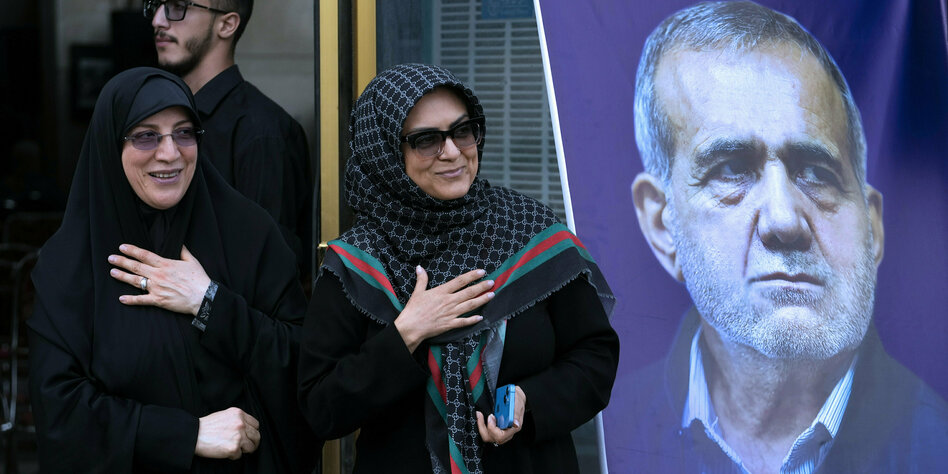There are still three conservatives and one reformist in the race ahead of Friday's election in Iran. Khamenei has set a trap for the reformers.

Supporters of Iranian presidential candidate Massoud Peseschkian in Tehran on Sunday Photo: Vahid Salemi/dpa
SEDAN cup | Iran is facing an election that is more of a spectacle than a democratic process. A new president is set to be elected on Friday following the helicopter crash of former President Ebrahim Raisi in May. Two weeks ago, the so-called Guardian Council approved six candidates, two of whom withdrew their candidacy on Wednesday and Thursday respectively.
The election of the Guardian Council already suggested a concentration of power by Ali Khamenei, the country's supreme leader. Therefore, many people in Iran consider the elections to be largely decided, with minimal influence from voters.
Iran's official political landscape is divided into two factions: principlists (conservatives) and reformists. After the withdrawal of Amirhossein Ghazizadeh Hashemi and Alireza Zakani, three conservatives close to Khamenei and a candidate who presents himself as a reformist remain among the approved candidates. Truly opposition candidates will not be accepted.
The main candidates are Mohammad Bagher Ghalibaf, Said Jalili and Massoud Peseschkian. Furthermore, there is another less prominent candidate who has almost no chance and is apparently only running to boost the electoral campaign: Mostafa Pour-Mohammadi.
Former military commander Ghalibaf is currently parliament speaker and mayor of the capital Tehran until 2017. The 62-year-old is a staunch supporter of Khamenei. He belongs to both the powerful paramilitary Revolutionary Guard and the police. His name is also closely linked to widespread corruption in the country. Ghalibaf would likely continue the course of the previous government, cracking down on dissent and advocating limited nuclear negotiations with Western states.
Said Jalili, a member of the so-called Arbitration Council, is known for his resolute rejection of the nuclear deal signed in 2015. It is currently on hold after the US under Donald Trump withdrew from it in 2018, after which Iran no longer adhered to the agreements. Jalili led the Iranian team in the nuclear negotiations from 2007 to 2013. They initially failed due to his uncompromising positions on the issue of uranium enrichment. In response, the US and the UN imposed severe sanctions against Iran. The impact was so severe that Jalili himself was harshly criticized by diplomats close to Khamenei, such as former Foreign Minister Ali Akbar Velayati.
Reformer at the mercy of the regime
Massoud Peseschkian is considered a reformer. He is known for his time in Mohammad Khatami's cabinet (1997-2005) and for his critical statements on social issues. He was never a well-known figure in the reformist camp. However, he has supporters in his home province of East Azerbaijan, which ensures him a place as one of the few reformist forces in the conservative-dominated parliament. Unlike some reformists who have been jailed for their positions, Peseschkian has never fallen out of favour with the government. He is even closely linked to Khamenei. Although he was initially excluded from the parliamentary elections in March, he was later admitted thanks to Khamenei's intervention.
Many reformist supporters in Iran do not have high hopes for Peseschkian. He is considered an emergency candidate, while other more qualified people were not admitted. A statement he made on the day of his registration for the election showed that Peseschkian does not take himself too seriously. He only came to “heat the electoral oven,” he said. Although reformers have campaigned widely for him, he is unlikely to succeed as long as the public stays away from elections and voter turnout is low. Although Peseschkian has little chance of becoming president, he is attracting a lot of attention. Currently the news is mainly about him.
By allowing Peseschkian in, Khamenei has set a trap for the reformers, who are likely to fail. However, the reformers are encouraging people to vote by putting issues such as resuming nuclear negotiations and abolishing the moral police on the agenda. However, a large part of society sees the reformers as fig leaves meant to maintain the appearance of a real competition between candidates. In the end, whoever Khamenei wants will emerge victorious from the election anyway.
Clash between Ghalibaf and Jalili
A showdown between Ghalibaf and Jalili is more likely than a Peseschkian victory. Speculation suggests that Ghalibaf is a more suitable choice for Khamenei for several reasons. First, given his military experience, he is likely to be more successful in suppressing resistance to the mandatory veil and maintaining national security. He is also seen as a conservative politician and technocrat capable of continuing the path of Raisi’s government. Jalili, on the other hand, lacks government experience. Moreover, as president he would further increase international tensions, which does not suit Khamenei, who is already in a delicate situation with Israel given the Gaza war.
Khamenei's likely preference for Ghalibaf is reinforced by the fact that Ghalibaf won the March parliamentary elections against candidates from the so-called Paydari Front, which is closely linked to Jalili. This victory is widely believed to have been orchestrated behind the scenes by Khamenei.
If a hard-liner like Khamenei becomes Iranian president and Donald Trump returns as US president next year, the likelihood of a new nuclear deal is almost zero. Worse, the situation could lead to open war in the region. On the other hand, if a conservative like Ghalibaf comes to power, who is as obedient to Khamenei as Raisi but not as radical as Khamenei, the Islamic Republic will continue its pragmatic policies and fragmented negotiations with the United States, especially if Joe Biden and the Democrats are in power. The United States remained in power. This could be the best scenario for Khamenei because in the Biden era, Iran was able to sell a million barrels of oil a day despite US sanctions.
